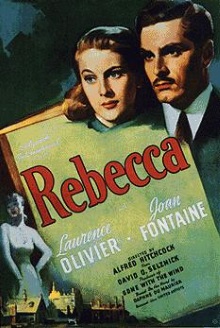
Rebecca has the distinction of being the first film that Alfred Hitchcock made in the United States. I was surprised to note that his body of work prior to this while he was still based in England is quite significant beginning all the way back in 1925 with silent films. This makes it quite impossible to really watch his entire filmography. This one is not an especially notable work but it piqued my interest when it was subject of discussion on Broken Forum not too long ago.
A young woman is working as a paid companion to a middle-aged lady in Monte Carlo when she encounters the aristocratic Maxim de Winter. He appears to be brooding about the death of his first wife Rebecca but meeting this woman appears to cheer him and following a whirlwind romance they marry and she becomes the new Mrs. de Winter. They move to the sprawling mansion of Manderley where the new wife is introduced to the forbidding housekeeper Mrs. Danvers and the other staff members. Though she is ostensibly the new mistress of the house, the woman finds that traces of Rebecca’s presence everywhere and feels intimidated. Her self-confidence is further damaged by Mrs. Danvers who adored Rebecca and takes every opportunity to denigrate the new wife. This leads her to believe that Maxim de Winter is still hopelessly in love with Rebecca and that their marriage is doomed.
One of the most remarkable things about this film is something that I realized only when I sat down to write this post. The name ‘Rebecca’ crops up over and over again but we never see her, not even so much as in a photograph. That’s normal enough. However the protagonist of the film, the young woman who becomes the second Mrs. de Winter is never given a first name of her own. From what I can tell, this is a deliberate omission that comes straight from the Daphne du Maurier novel upon which this film is based. This serves to help make the protagonist even smaller and unimportant while the unseen Rebecca looms large in the background. Another is how the film opens with a languorous introduction to Manderley house, dropping hints of some awful, tragic event that happened there, yet actually misleads the audience to draw the wrong conclusion. The entire film is really a series of such misdirections which contribute to the main character’s increasing isolation and sense of being lost.
Rebecca lacks the masterful flourishes of Hitchcock’s later works. There’s no one key moment which forces you to acknowledge how brilliant the great director is and even the twist here is both fairly predictable and kind of tame. I also note that in its belittlement of the main character, there are signs of the director’s famous misogyny. Maxim de Winter really treats the main character as a kind of child or pet instead of anything approaching an equal partner and the woman submits to that treatment without any struggle. Still, this is a solid film that would be a very worthy entry in the filmography of any lesser director and makes for a satisfying watch.